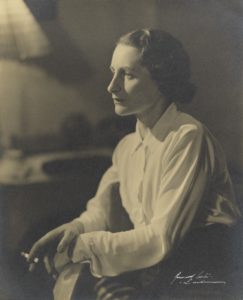
Socialist, pacifist, and feminist, Vera Brittain contributed regularly to Time and Tide during the 1920s and into the early 1930s, later recalling how she had been intrigued by this ‘journalistic innovation made exclusively by women’ while a student at Oxford. It was through Time and Tide that she first heard about the Six Point Group, the feminist organisation inaugurated in February 1921 and of which she became an active member.
Vera Mary Brittain was born in December 1893 in Newcastle under Lyme, to Edith Mary and her husband Arthur, a paper manufacturer. The family moved to Macclesfield and in 1905 settled in Buxton, where Brittain began her education, attending the Grange School for two years before transferring to St Monica’s boarding school in Kingswood, Surrey. Shortly after the First World War broke out in 1914, she became a student of English literature at Somerville College, Oxford, but quit in 1915 to become a nurse, joining the Voluntary Aid Detachment (VAD). She returned to Somerville in 1919, this time to study modern history, and was awarded a second-class degree in 1921. Her close friendship with Winifred Holtby began during her second stint at Oxford; they lived together in London after graduating, and after Brittain married political scientist George Catlin, Holtby moved into their family home.
Brittain discovered her passion for writing as a child. She wrote 29 books, including five novels; but although she aspired to become known as a novelist, it is with journalism and memoirs that she is most associated. She contributed articles and reviews to a varied range of publications, including the Manchester Guardian, the Daily Herald, the Yorkshire Post, the Christian Pacifist, the National Council of Women News, John O’London’s, Modern Woman, and Good Housekeeping. Her books include a memoir of Holtby, who died aged just 37 in 1935 (1940), a biography of suffragette Emmeline Pethick-Lawrence (1963), and a history of women at the University of Oxford (1960). By far her most famous work is her First World War memoir, Testament of Youth (1933) in which she documents her experiences of nursing and loss, and makes her case for pacifism.
Brittain’s politics were socialist, pacifist, and feminist. She was a member of both the Labour Party and the Peace Pledge Union (PPU), the pacifist organisation formed by Canon Dick Sheppard in 1934. She published a biweekly Letter to Peace-Lovers throughout the Second World War, which criticised British bombing campaigns, and remained active in the peace movement for the rest of her life, chairing the PPU and joining the Campaign for Nuclear Disarmament. Brittain was also active in the Six Point Group: the equal rights feminist organisation established in 1921 by (among others) Time and Tide founder and editor Lady Rhondda, and of which Time and Tide itself was an unofficial organ. Along with Holtby, Brittain first became aware of the Six Point Group through Time and Tide, and in 1922 they addressed an open-air meeting in support of the Group’s campaign to improve legislation surrounding child assault. Brittain was later instrumental in the Group’s move to embrace a more international feminist outlook, addressing a series of weekly meetings on the subject during the autumn of 1928 and authoring two Six Point Group pamphlets in 1929, including “Geneva – the Key to Equality” (which first appeared in Time and Tide in two parts as “Feminism at Geneva”). Her 1927 Six Point Group pamphlet “Why Feminism Lives” stressed the ongoing need for feminism, which, she argued, would have a role to play until women had achieved full equality with men.
Brittain made her first contribution to Time and Tide in 1922. For the best part of a decade she contributed leaders, book reviews, and other articles, and was included in a 1928 ‘Personalities & Powers’ column (written by Winifred Holtby under a pseudonym) celebrating Oxford-educated female novelists. Her relationship with Lady Rhondda was difficult, however, and she ceased writing regularly for Time and Tide in 1932. Angered by Rhondda’s reliance on Holtby when the latter was unwell, she subsequently portrayed the older woman critically in her memoir of Holtby, Testament of Friendship (1940). Brittain’s pacifism became a further source of disagreement with Rhondda during the Second World War, and she felt provoked by E. M. Delafield’s critical review in Time and Tide of England’s Hour (1941), her memoir of the years 1939-1941, which she believed had been arranged by Rhondda. Their relationship never recovered. Brittain died in a nursing home in March 1970, aged 77.
By Dr Eleanor Reed
Sources:
Edited Paul Berry and Alan Bishop, Testament of a Generation: The Journalism of Vera Brittain and Winifred Holtby. London: Virago Press Limited, 1985
Brittain, Vera. Testament of Friendship: the Story of Winifred Holtby. London: Virago, 2012 (1940)
Clay, Catherine. Time and Tide: The Feminist and Cultural Politics of a Modern Magazine. Edinburgh: Edinburgh University Press, Ltd, 2019 (2018)
Gorham, Deborah. Vera Brittain: A Feminist Life. Cambridge MA: Blackwell Publishers, 1996
John, Angela V. Turning the Tide: The Life of Lady Rhondda. Cardigan: Parthian, 2013